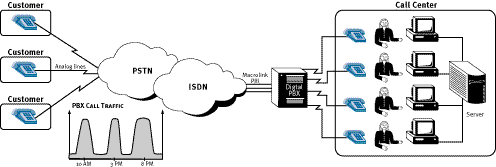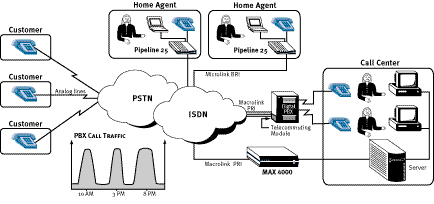
Sales Tools
Australian VAN Supplier Reduces Call Center Cost through Teleworking
| Background An Australian value-added network supplier publishes a toll-free number that lets customers place orders, ask questions or voice complaints about the company's telephone and mobile phone services. Fifty customer service representatives (CSRs), working two shifts at the company's downtown call center, answer customer calls between the hours of 7 AM and 11 PM. An Automatic Call Distributor (ACD), special software that is part of the company's PABX, places the calls on hold until a CSR becomes free and evenly distributes calls among available CSRs. The majority of customers phone the call center at three peak periods during the day - from 10:30 AM to 11:30 AM, from 2:30 PM to 3:30 PM and from 7:30 PM to 9 PM. During these peaks, all 50 of the company's CSRs are continually busy answering calls and customers may be on hold for up to a minute. But throughout the rest of the day, the volume of calls drops dramatically and several minutes may elapse between customer phone calls. |
Application
Current Approach The Need |
Australian VAN Supplier - Previous Network

The Solution
Paying full-time CSRs to sit idle during part of their shift is putting a strain on the call center's budget. So call center managers devised a plan that lets the company utilize its human resources more efficiently but still gives customers the service they deserve. The plan calls for cutting back full-time staff at the call center to 25, a level sufficient to handle calls during off-peak hours. During peak hours, an additional 25 CSRs are hired to work split shifts from offices in their homes.
To implement the new plan, the company needed a solution that would allow teleworking CSRs to answer its 1-800 number and query its customer database, at the same time. The solution had to meet several crucial requirements. First, it had to provide CSRs with database response times that are close to the response times they experience when working in the call center. Second, it had to work with regular analog phones, instead of the costly digital headsets used in the call center. Third, it had to keep charges for the CSRs' business lines completely separate from the charges for their personal phone line. Finally, the solution had to provide trouble free set up and operation, so that CSRs could use the equipment without on-site help from IS staff.
How it Works
Ascend's end-to-end digital solution meets all of these requirements, and then some. At its call center, the company has installed a MAX 4000 that aggregates incoming data calls from CSRs onto ISDN PRI access lines and connects them to the corporate LAN. At each CSR's home the company has installed a Pipeline 25, an integrated access device that lets users set up simultaneous voice and data connections over a single ISDN BRI connection.
| The Pipeline 25 is ideally suited to the
company's teleworking application. By consolidating voice
and data traffic onto one access line, the Pipeline 25
cuts down hefty installation fees and monthly line
charges and provides a single point of contact for
management and security. In addition, it is extremely
easy to use. CSRs simply plug their regular analog phones
into an analog port on the Pipeline 25, plug their
computer into the unit's Ethernet port, and they're ready
to answer customer service calls. Calls are transmitted to teleworkers over the ISDN network via a Teleworking Module attached to the PABX. This module routes incoming calls to off-site CSRs. They terminate on the Pipeline 25, causing the teleworker's phone to ring. While a teleworker is talking to a customer over one "B" channel of his ISDN line, he uses the other "B" channel to access the customer's database records at 64 Kbps. The whole operation is transparent to both the ACD managing the call and to the caller, who can't tell if a CSR is working at home or in the call center. By allowing this value-added network supplier to set up a successful teleworking program, the MAX-Pipeline solution has helped the company cut down on payroll expenses and maintain its high level of customer service. Employees are enjoying the benefits of teleworking too. Instead of commuting to the call center in rush hour traffic, CSRs now have flexible work hours. |
Ascend Equipment The Benefits |
Australian VAN Supplier

Copyright ©1998 Ascend Communications, Inc. All rights reserved.
![]()